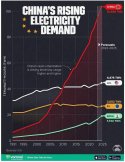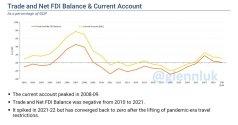You are using an out of date browser. It may not display this or other websites correctly.
You should upgrade or use an alternative browser.
You should upgrade or use an alternative browser.
Chinese Economics Thread
- Thread starter Norfolk
- Start date
Probably a 50/50 between 4.8 and 4.9 at this rate. Unlikely we'll hit 5% after today's printAs the first 3Q came out to 4.8% and for all intents and purposes Q4 is looking to be running ahead of Q3 (which was 4.6%), I think it is with very high likelihood that GDP growth for 2024 will be anywhere between 4.8% to 5.0% - call it 4.9% for simplicity sake.
~5% GDP growth is a fantastic number for any country, but how does everyone on this Forum feel about it?
Gao said China's GDP probably averaged around 2% in the last two to three years even though the official number is "close to 5%," Gao said.
"If my speculation is correct, I think it might be more reasonable to expect a growth rate between 3% to 4% in the years to come, for the next three to five years," Gao said. "But we know, and I think, the official number will always be around 5%."
China reported 5.2% GDP growth last year and has a growth target of this year — which economists said is ambitious.
While there have been over the veracity of China's GDP data, one economist explained to in 2022 that the headline GDP figure is "systematically inflated" due to how it's calculated and that it's unlikely the central government in Beijing
Anyone familiar with Gao Shanwen? What's the context of his career?
Retail sales still sucks, central government give the cash for kids!
Anyone familiar with Gao Shanwen? What's the context of his career?
Gao works for Essence Securities. He's a big American fanboy and recently claimed that in the 80s the US sold China weapons so advanced that it had refused to supply UK with. Anyone with knowledge on history of Sino-US defense ties to comment on this claim?
There is just a very disconnection between gdp growth and consumer sentiment these days. Not only in US or in Europe but even China and Asia in general. 4.x% whatever is good for China-size economy but people's confidence is low judging from my friends and professional network. Vietnam or India have like 6.x% but youngster struggle then ever, and unemployment higher than ever. No need to talk more the US. Where did the economic growth go?
In real life, China's trade with the world is pretty much in balance–and 90% of China's 'exports' to the USA is goods manufactured by Chinese workers in American-owned factories,.The BBC is reporting today that the Chinese Government has imposed temporary price controls on :
More at the link.
This is a little unsettling, particularly when the U.S. economy is in the midst of economic troubles of its own occasioned by the mortgage default crisis. James Fallows wrote an interesting piece in the January/February 2008 edition of The Atlantic Monthly on the present interdependent economic relationship between China and the U.S. In it, Fallows describes how Chinese Government policies on economic and social development intended to minimize the potential for major disruptions, coupled to the effects of the decline in value of the U.S. dollar on both the purchases of Chinese manufactures and Chinese investments in U.S. securities, taken together may in effect conspire to bring about a serious economic and subsequently political break between the two countries and serious social and political instability, particularly within China. It's only four pages, and well worth the read: by James Fallows.
Attachments
China is going through a massive real estate de-leveraging and a massive trade and tech war where the US is doing all it can to retard Chinese growth.
And it is going through a massive restructuring from a RE-led economy to a R&D/High Technology manufacturing one.
The RE crisis alone should have crushed growth and stifled demand. In the 2008 RE crisis, the US went into outright recession and electricity demand plummeted 4.2% in 2009.
China's electricity demand in 2023 increased by 7% and it is on track to grow by that much again this year.
People caught up in the Western narrative for China refuse to see how incredible any growth is and how immensely potent this constant surge in electricity demand is and how well this bodes for the future:

All economic activity in a modern economy run on electricity.
And it is going through a massive restructuring from a RE-led economy to a R&D/High Technology manufacturing one.
The RE crisis alone should have crushed growth and stifled demand. In the 2008 RE crisis, the US went into outright recession and electricity demand plummeted 4.2% in 2009.
China's electricity demand in 2023 increased by 7% and it is on track to grow by that much again this year.
People caught up in the Western narrative for China refuse to see how incredible any growth is and how immensely potent this constant surge in electricity demand is and how well this bodes for the future:

All economic activity in a modern economy run on electricity.


